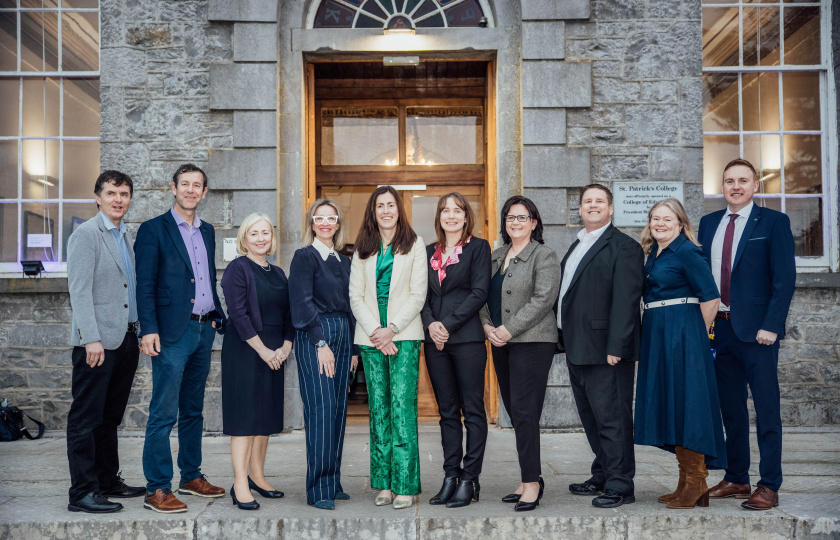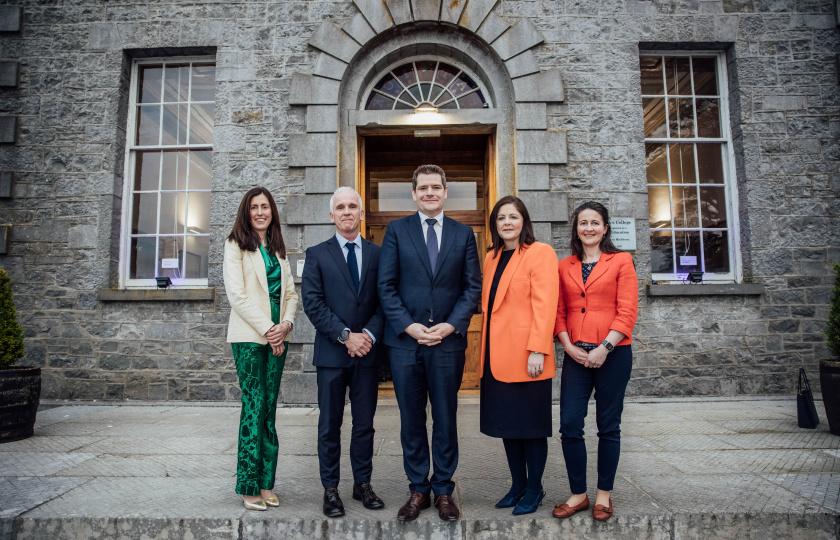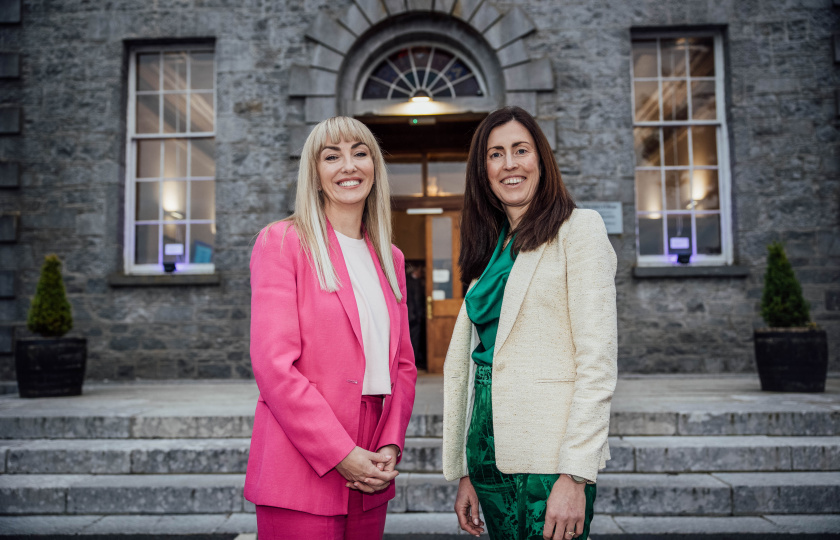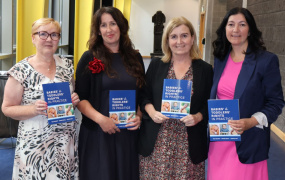Business & Accounting
Welcome & About
Welcome to the Department of Business and Accounting.
Established in 2025, the Department is dedicated to excellence in teaching and learning at undergraduate and postgraduate levels. Alongside this commitment to academic rigour, is an embedding of the practical relevance of Business and Accounting through skills development. Underpinning our work is a strong emphasis on entrepreneurship and the fostering of entrepreneurial mindset in our graduates.
Our members of staff are committed teachers and active researchers. They are all highly qualified in their respective disciplines, many with real-world industry experience. Their approach to teaching mirrors this important link between education and industry, ensuring that our graduates gain the necessary applied skills for their future careers.
Business and Accounting at Undergraduate Level
At undergraduate level students can study Business and Accounting on the following programmes;
MIC Thurles Campus
- BA in Education, Business Studies and Accounting (MI016)
- BA in Education, Business Studies and Religious Studies (MI017)
- BA in Education, Gaeilge and Business Studies (MI019)
- BA in Education, Mathematics and Business Studies (MI021)
- BA in Education, Home Economics and Business Studies (MI022)
MIC Limerick Campus
- Bachelor of Arts (MI002)
Staff
Undergraduate
The Department of Business and Accounting offers a comprehensive education in the disciplines of Business and Accounting. Our committed staff draw on their research and industry experience to design challenging and applied learning experiences, that prepare our graduates for rewarding and varied careers in industry, entrepreneurship and education. No previous study of Business or Accounting is required to take either subject at MIC.
Business
Business at MIC encompasses the study of the disciplines of Marketing, Management, Economics, Entrepreneurship, Business Environment and Information Systems. Students studying Business at MIC meet all of the requirements of the Teaching Council for the teaching of Business at junior and senior cycle levels. By studying Business students will develop many transferable skills beneficial to a wide range of career pathways and gain a comprehensive understanding of the changing world of business and work. The Business modules taught in both Thurles and Limerick are listed below.
Limerick Campus - Business
See below for a list of modules in the Bachelor of Arts programme:
Module Description
This module is designed to provide a comprehensive introduction to the area of management. It introduces students to key managerial issues and wider environmental factors affecting organisations. This module aims to develop with students a realistic understanding about management practice and to investigate this in line with management theory. It is designed and delivered to address management issues with specific focus on culture, ethics, leadership and sustainable management practices.
ECTS Credits: 6
Module Description
This module seeks to examine the nature and purpose of Marketing. As a discipline, Marketing has both organisational and societal underpinnings. This module is designed to support students in exploring marketing practice from both an organisational and societal perspective. The module will trace the development of marketing as a business philosophy. Students will also engage with contemporary marketing issues including changing consumption behaviour, the global factors at play in marketing and the focus on customer experience and engagement. A strong focus will be on developing the creative mindset to appreciate and develop a strategic marketing campaign focusing on real-world situations.
ECTS Credits: 6
Module Description
An understanding of statistical and mathematical concepts is central to the modern practice of business. Much of the relevant academic business literature and corporate research is highly mathematical, thus the ability to interpret and analyse mathematical findings is essential for modern business students. The purpose of this module is to develop computational and mathematical skills and to prepare learners for the practical application of these concepts in relevant business and financial situations. This module also seeks to develop, with students, a systematic approach to dealing with numerical data in business and financial contexts.
ECTS Credits: 6
Module Description
Organisations do not operate in a vacuum; instead they form part of a complex eco-system consisting of other firms, local communities, the Government and the wider domestic and international economies. This module introduces students to economic theory. The objectives are to provide students with the basic tools to apply economic analysis to real life problems and to ensure an understanding of macroeconomic issues such as unemployment and inflation. It assumes that students have no prior knowledge.
ECTS Credits: 6
Module Description
Those involved in decision making in organisations must have a broad knowledge of the principles of Irish and EU law and their impact on commercial transactions. The purpose of this module is to introduce learners to the legal and regulatory environment in which a business operates and to develop an awareness of the legal issues relevant to management practice. In so doing this module provides an overview of the legal context of business through an examination of Irish and EU law. This module also investigates contract law and tort. Learners are also exposed to an investigation of the law relating to commercial transactions, company law and the protection of proprietary knowledge through intellectual property law.
ECTS Credits: 6
Module Description
The Business Studies Accounting module provides students with understanding of fundamental accounting concepts and terminology. It assumes no prior knowledge of the subject area but rather introduces and progressively builds on a series of key accounting topics. Overall, the module aims to provide learners with the necessary skills, knowledge, and competence to assemble, record, process, analyse, and interpret financial statements with adjustments, to prepare and interpret cash budgets, and to provide for material and stock control.
ECTS Credits: 6
Module Description
Organisations are complex social entities encompassing many problematic organizational and managerial issues. The purpose of this module is to familiarise students with this ambiguity, through a political, psychological and sociological understandings of human behaviour in organisations. This module aims to investigate the complex behavioural issues that concern individuals and groups in the workplace, while also emphasising that organizational behaviour does not occur in a vacuum, but happens within a wider social, political, economic and cultural context. Overall, this module aims to highlight the complexities arising from the social processes that constitute life in organisations.
ECTS Credits: 6
Module Description
This module introduces students to both the theoretical and practical underpinnings of entrepreneurship. Through an exploration of the entrepreneurial context and new firm formation the module provides opportunities for students to develop and demonstrate knowledge and understanding of the importance of entrepreneurship and the entrepreneurial process. Building upon theoretical concepts, the module also gives students a more pragmatic insight into the processes and systems required to conceive, research, and present a credible business plan in order to gain the necessary resources to start a new entrepreneurial firm. The overall aim of the module is to aid in the development of an entrepreneurial mind-set among students, including; developing abilities in creativity, innovation and problem solving, all of which are built upon an appreciation of the role and function of entrepreneurs and their impact on society.
ECTS Credits: 6
Module Description
Increasingly managers across all disciplines are tasked with managing information and information systems, to improve both their personal performance and the overall organisation’s performance. In today’s business landscape, there is often a need for managers to guide their organisations through complete ‘digital transformations’ in order to keep pace with the rate of business and technological change and to remain competitive in the ‘digital’ era. The purpose of this module is to introduce students to Information Systems in the context of business, with a focus on the application of Information Systems in the facilitation of business processes and the realisation of business value. The module aims to give students a realistic understanding of how continuing developments in Information Technology influence the use of Business Information Systems and contribute to business success. In addition, students will gain skills in business analytics and decision support systems by engaging with advanced spreadsheet (MS Excel) and database management (MS Access) programs.
ECTS Credits: 6
Module Description
This module will provide students with an evidence-based analysis of the Irish economy and its place within the global economy. Driven by the concept of ‘globalisation’, the global economy is characterised by a high level of economic, cultural, political, and technological interdependence among national institutions and economies, which enables a freer flow of goods and services across national borders. This module explores the nature of the global economy in terms of its key growth indicators, its economic development, instances of regional economic integration, trends in international trade, and the ethical challenges of globalisation. The Irish economy is one of the most globally integrated economies in the world. This module further explores Ireland’s position within the global economy, built upon an understanding of the historical and current performance of the Irish economy itself and its transition from a small closed economy to a regional economy with high levels of integration.
ECTS Credits: 6
Module Description
Strategic Management is the process of formulating, implementing, and evaluating decisions that enable an organisation to achieve its objectives and ultimately gain and maintain competitive advantage. This module is the capstone module of the Business Studies Degree. It examines the complexities and uncertainties surrounding managerial decision making at the strategic level of organisations - small-medium enterprises, multinationals, charities, and government agencies. Strategic management raises the ‘big’ questions about these organisations – how they grow, innovate, and change in an ever-evolving business landscape. The module aims to provide an appreciation of the dynamic and uncertain nature of strategic management in practice, the process of strategy formulation, and the structures and systems required for strategy implementation within an organisation. Students will gain a comprehensive understanding of the issues and techniques that underpin strategy and strategic management through the application of theory, using a case study approach.
ECTS Credits: 6
Thurles Campus - Business
See below for a list of modules in the Bachelor of Arts, Education (Post-Primary) programmes:
Module Description
An understanding of statistical and mathematical concepts is central to the modern practice of business. Much of the relevant academic business literature and corporate research is highly mathematical, thus the ability to interpret and analyse mathematical findings is essential for modern business students. The purpose of this module is to develop computational and mathematical skills and to prepare learners for the practical application of these concepts in relevant business and financial situations. This module also seeks to develop, with students, a systematic approach to dealing with numerical data in business and financial contexts.
Learning Outcomes
- Analyse, interpret and present statistical data and business problems in a logical and coherent manner
- Apply algebraic formulae to a range of business problems and solve financial problems using relevant tools and techniques
- Perform calculations using Time Series and Index Numbers and provide interpretations of the results
- Apply the techniques of regression analysis and linear programming to relevant business and financial examples
- Develop a confident approach to using and applying business mathematics.
- Develop information technology skills using spreadsheets to present and manipulate data.
ECTS Credits: 6
Year: 1
Module Description
This module is designed to provide a comprehensive introduction to the area of management. It introduces students to key managerial issues and wider environmental factors affecting organisations. This module aims to develop with students a realistic understanding about management practice and to investigate this in line with management theory.
Learning Outcomes
- Investigate the concept of the organisation, the organisation’s environments and the tools available to managers when evaluating their internal and external environment
- Explain the concepts of stakeholders, business ethics and corporate social responsibility
- Evaluate key management concepts, including the functions of management and the skills of effective and efficient management practice
- Analyse a business case study
- Appreciate historical influences on contemporary management approaches.
- Recognise the complex nature of management in organisations
ECTS Credits: 6
Year: 1
Module Description
This module seeks to examine the nature and purpose of Marketing. As a discipline, Marketing has both organisational and societal underpinnings. This module is designed to support students in exploring marketing practice from both an organisational and societal perspective. The module will trace the development of marketing as a business philosophy. Students will also engage with contemporary marketing issues including changing consumption behaviour, the global factors at play in marketing and the focus on customer experience and engagement.
Learning Outcomes
- Evaluate the activities conducted by marketers.
- Analyse the factors impacting on the marketing function, including environmental and consumer based factors.
- Engage with marketing mix activities from both a theoretical and a practical perspective.
- Evaluate the impact of marketing as a cultural force on society
ECTS Credits: 6
Year: 1
Module Description
An understanding of statistical and mathematical concepts is central to the modern practice of business. Much of the relevant academic business literature and corporate research is highly mathematical, thus the ability to interpret and analyse mathematical findings is essential for modern business students. The purpose of this module is to introduce students to fundamental computational and mathematical skills applicable to business and to prepare learners for the practical application of these concepts in relevant situations. This module also helps students develop a systematic approach to dealing with numerical data in business and financial contexts. This module differs from the 6 credit Business Mathematics module (MH4741) in terms of the syllabus, teaching strategy, learning outcomes and mode of assessment.
Learning Outcomes
- Prepare, interpret and present statistical data in a logical and coherent manner
- Demonstrate the application of algebraic formulae to a range of business problems and solve financial problems using relevant tools and techniques
- Perform fundamental calculations using Time Series analysis and interpret the results
- Use the techniques of regression analysis in relevant business and financial examples
- Develop a confident approach to using and applying business mathematics.
- Develop information technology skills using spreadsheet techniques to present and manipulate data.
ECTS Credits: 3
Year: 1
Module Description
Business Studies Accounting aims to provide learners with the necessary skills, knowledge and competence to assemble, record, process, analyse and interpret financial statements with adjustments. It also aims to provide the skills necessary to prepare and interpret cash budgets, as well as providing for material and stock control.
Learning Outcomes
- Apply fundamental accounting concepts and introduction to accounting terminology
- Apply principles of the Double Entry System of Book-keeping in order to prepare a Trial Balance , Statement of Comprehensive Income and Statement of Financial Position with adjustments
- Perform, interpret and report on ratio analysis of financial statements
- Examine various IASs, including IAS 2, IAS 16 and IAS 37
- Prepare and Interpret cash budgets
ECTS Credits: 6
Year: 2
Module Description
Those involved in decision making in organisations must have a broad knowledge of the principles of Irish and EU law and their impact on commercial transactions. The purpose of this module is to introduce learners to the legal and regulatory environment in which a business operates and to develop an awareness of the legal issues relevant to management practice. In so doing this module provides an overview of the legal context of business through an examination of Irish and EU law. This module also investigates contract law and tort. Learners are also exposed to an investigation of the law relating to commercial transactions, company law and the protection of proprietary knowledge through intellectual property law.
Learning Outcomes
- Identify the key structures of the Irish and European legal system and explain how they apply to business in Ireland
- Evaluate the principles of contract law, tort, commercial law and EU law
- Demonstrate a critical understanding of the duty of intellectual property law and its role in the creation of value for organisations
- Apply the concepts and principles of the law to business situations
ECTS Credits: 6
Year: 2
Module Description
Organisations do not operate in a vacuum; instead they form part of a complex eco-system consisting of other firms, local communities, the Government and the wider domestic and international economies. This module introduces students to economic theory. The objectives are to provide students with the basic tools to apply economic analysis to real life problems and to ensure an understanding of macroeconomic issues such as unemployment and inflation.
Learning Outcomes
- Assess the theoretical basis of micro- and macro-economic issues and the debates surrounding them.
- Estimate price, quantity and equilibrium of different market structures.
- Evaluate the impact and effect of micro-economic and macro-economic issues and policies on national key economic indicators.
- Appreciate Economics as a discipline and its applications for everyday life.
- Form opinions on Economic issues based on considered research and informed thought.
ECTS Credits: 6
Year: 2
Module Description
Increasingly managers are tasked with managing information and information systems, to improve their personal performance and the overall performance of the organisation. The purpose of this module is to introduce students to Information Systems in the context of business, with a focus on the application of Information Systems in the facilitation of business processes. The module aims to give students a realistic understanding of how continuing developments in Information Technology influence the use of Business Information Systems and contribute to business success. In addition, students will gain skills in business analytics and decision support systems by engaging with advanced spreadsheet and database management programs, using MS Excel and MS Access respectively.
Learning Outcomes
- Analyse the concept of Information Systems, the management of IS and how IT impacts business environments
- Explain how ethical, legal and security issues impact on an organisation’s use of IS
- Discuss the importance of networks and data communication, and systems analysis, design and control to business
- Demonstrate proficiency in advanced MS Excel and MS Access skills
- Develop information technology skills using spreadsheet and database software to present and manipulate data
ECTS Credits: 6
Year: 3
Module Description
Organisations are complex social entities encompassing many problematic organizational and managerial issues. The purpose of this module is to familiarise students with this ambiguity, through a political, psychological and sociological understandings of human behaviour in organisations. This module aims to investigate the complex behavioural issues that concern individuals and groups in the workplace, while also emphasising that organizational behaviour does not occur in a vacuum, but happens within a wider social, political, economic and cultural context. Overall, this module aims to highlight the complexities arising from the social processes that constitute life in organisations.
Learning Outcomes
- Analyse the complexities of organisations as social systems
- Evaluate key concepts and theories with regard to individual behaviour in organisations
- Evaluate key concepts and theories with regard to group and team behaviour in organisations
- Evaluate key concepts and theories with regard to organizational level processes and structure
ECTS Credits: 6
Year: 3
Module Description
The Irish economy is one of the most globally integrated economies in world. As such the objective of this module is to explore Ireland’s position within the world economy. This exploration is built upon an understanding of the Irish economy itself and its transition from a small closed economy to a regional economy with high levels of integration with the global economy. The course then explores the global economy in terms of growth, production and international trade. The overall aim of this module is to provide students with an evidence-based analysis of the Irish economy and its place within the global economy.
Learning Outcomes
- Analyse the factors that have led to Ireland's economic development
- Critically evaluate Ireland's role in the world economy
- Critically assess the theoretical basis of global economic issues and the debates surrounding them
- Evaluate current economic issues and challenges facing the global economy.
ECTS Credits: 6
Year: 3
Module Description
This module introduces students to both the theoretical and practical underpinnings of entrepreneurship. Through an exploration of the entrepreneurial context and new firm formation the module provides opportunities for students to develop and demonstrate knowledge and understanding of the importance of entrepreneurship and the entrepreneurial process. Building upon theoretical concepts, the module also gives students a more pragmatic insight into the processes and systems required to conceive, research, and present a credible business plan in order to gain the necessary resources to start a new entrepreneurial firm. The overall aim of the module is to aid in the development of an entrepreneurial
mind-set among students, including; developing abilities in creativity, innovation and problem solving, all of which are built upon an appreciation of the role and function of entrepreneurs and their impact on society.
Learning Outcomes
- Evaluate the nature of entrepreneurship and the characteristics and roles of the entrepreneur
- Discuss the economic and societal functions of entrepreneurship
- Evaluate the management challenges faced by entrepreneurs
- Analyse the role of the social entrepreneur and the values underpinning social entrepreneurship
- Critically assess the economic/social viability of a new business through the application and use of business planning.
- Develop an appreciation of the entrepreneurial mind-set and the entrepreneurial journey
ECTS Credits: 6
Year: 3
Module Description
Strategy is concerned with the overall direction of the firm, and the complex and uncertain decision-making processes taken with a view to creating a sustainable competitive advantage. The module examines the complexities surrounding managerial decision making at the strategic level of the firm. In so doing, the module aims to provide an appreciation of the dynamic and uncertain nature of strategic management in practice, the process of strategy formulation, and the structures and systems required for strategy implementation within an organisation.
Learning Outcomes
- Critically evaluate organisational systems from a strategy perspective, including the strategic purpose of the firm&
- Determine the use of appropriate models and analytical tools to analyse the firm’s internal and external environment, in the context of sustaining competitive advantage
- Explain methods used to pursue strategies and evaluate strategic options
- Explain methods of strategy development and critique issues faced by managers when formulating and implementing strategy
- Apply strategic management theory to case scenarios of strategic management challenges.
ECTS Credits: 6
Year: 4
Accounting
Students can study Accounting at the MIC Thurles Campus. The study of Accounting encompasses Financial and Management Accounting, as well as Regulatory Framework and Corporate Reporting. Our Accounting Faculty have professional accountancy qualifications, as well as experience working in practice and industry. This ensures that the learning experience for our students is both relevant and applied. Students studying Accounting meet all of the requirements of the Teaching Council for the teaching of Accounting at senior cycle level.
See below for a list of Accounting modules on the BA in Education, Business and Accounting (Post-Primary)
Module Description
The purpose of Fundamental Accounting is to provide learners with introductory knowledge of accounting concepts and principles of accounting. The module will focus on developing a technical competency in the area of double entry accounting. The module will also provide an introduction to accounts preparation for various types of businesses, as well as a preliminary investigation of Business Ethics from an Accounting perspective.
Learning Outcomes
- Identify the various user groups of accounting information and describe their respective information requirements
- Apply fundamental accounting concepts
- Interpret the role of Business Ethics from a financial Accounting perspective
- Evaluate the form and content of accounting records and demonstrate the ability to record financial
- transactions in the books of original entry
- Demonstrate an understanding of, and application of the double entry system of bookkeeping and preparation of a trial balance
ECTS Credits: 6
Year: 1
Module Description
The purpose of the module Regulatory and Legal Framework of Accounting is to provide learners with an appreciation of the factors that shape and govern financial accounting, including the format and content of financial statements as required by certain statutes and other influences.
Learning Outcomes
- Evaluate the influence of legislation and accounting standards on the production of published accounting information for organisatios
- Appraise the accounting standard setting process and analyse specified accounting standards
- Identify and comment on professional ethical issues relevant to business owners, managers and accountants
- Describe Business ethics, Corporate Social Responsibility, Corporate Governance and Company Law requirements
ECTS Credits: 6
Year: 1
Module Description
Financial Accounting Principles aims to ensure that learners build on the competencies gained in Fundamental Accounting. The module introduces additional introductory financial accounting concepts and international standards, including IAS 2 and IAS 18.
Learning Outcomes
- Compare and contrast various forms of business ownership and key features of financial statements
- Apply further the double entry system of book keeping including applying financial accounting concepts, accruals and prepayments
- Prepare financial statements with adjustments for IAS 2 Inventory and IAS 18 revenue recognition, and IAS 16 Depreciation for additions, disposals and revaluations
- Apply IAS 37 for provisions and deal with Bad Debts
- Explain and use control accounts
ECTS Credits: 6
Year: 1
Module Description
The purpose of this module is to ensure that learners build on the competencies gained in Fundamental Accounting and Financial Accounting Principles and enhance their knowledge and understanding of more advanced financial accounting issues. This includes a more advanced application of the double entry system of book keeping and the preparation of associated financial statements.
Learning Outcomes
- A knowledge of and ability to analyse specified accounting standards
- An understanding of the distinction between capital and revenue expenditure
- Prepare the final accounts of different types of sole traders & manufacturing accounts of limited companies
- Prepare and interpret basic final accounts of limited companies
ECTS Credits: 6
Year: 2
Module Description
The purpose of Management Accounting Principles is to provide learners with introductory knowledge and technical competency in the area of management accounting, with a view to supporting business functions, activities and decision making.
Learning Outcomes
- Distinguish between Financial Accounting and Management Accounting in terms of nature, scope and users
- Examine materials, stock and remuneration methods and calculate the costs involved
- Generate appropriate product and service costs using traditional and modern approaches, notably activity based and traditional absorption costing
- Apply fundamental management accounting principles and techniques
ECTS Credits: 6
Year: 2
Module Description
The purpose of the module Management Accounting I is to further develop the technical competency in the field of management accounting. This module will provide learners with the knowledge, skills and competencies to apply the key management accounting principles necessary for management to make better decisions in relation to costing and pricing of products, effective budgets and improving profitability.
Learning Outcomes
- Calculate and interpret the cost of products and services using absorption costing
- Apply marginal costing principles in decision making including cost volume profit
- Interpret the price setting process and calculate and analyse appropriate variances
- Analyse budget administration procedures and the processes and principles of budgetary planning and control and prepare various types of budgets
- Apply fundamental management accounting principles and techniques
ECTS Credits: 6
Year: 2
Module Description
The purpose of this module is to ensure that learners build on the competencies gained in the previous Financial Accounting modules and develop a knowledge and understanding of how to apply more advanced financial accounting issues, including dealing with companies that manufacture products including those which have not maintained a double entry book-keeping system.
Learning Outcomes
- Prepare complete departmental Statement of Comprehensive Income and Statement of Financial Position with adjustments
- Explain and use suspense accounts as part of the internal control of an organization and prepare the year end accounts for different enterprises which have not maintained a double entry system of bookkeeping
- Explain and demonstrate and critically analyse and interpret financial statements through the use of ratio analysis as a technique in decision making and performance evaluation and demonstrate an ability to communicate these in professional manner to relevant interested parties
- Deal with leasing and Borrowing costs
ECTS Credits: 6
Year: 3
Module Description
Advanced Management Accounting aims to provide learners with a comprehensive understanding of the nature and application of advanced management accounting techniques, building on those developed in Management Accounting I. Advanced Management Accounting will focus on the application of this knowledge to aid decision making in organisations, with a particular focus on evaluative situations such as pricing and profitability analysis and allowing for risk.
Learning Outcomes
- Comprehensively evaluate the relevant costs and benefits of particular decisions in order to formulate a recommended course of action
- Evaluate and calculate the implications of various pricing strategies and Identify the optimal transfer pricing for trading situations
- Calculate and explain a significant range of variances
- Comprehensively assess and calculate the related measures in order to conduct performance analysis in divisionalised structures
ECTS Credits: 6
Year: 3
Module Description
The purpose of this module is to introduce central concepts of financial management. In so doing, the module examines the operations of capital markets and techniques used to aid corporate long-term and short-term planning. The module will also review the importance of managing working capital and the utilisation of the various sources of finance, including state aid. The workings of the Irish stock exchange and the workings of other financial institutions both home and abroad, will also be examined, as will the skills required to assess the feasibility of investing funds in capital equipment and the cost of capital to be used.
Learning Outcomes
- Discuss the nature of financial management, the role of the finance manager and the finance function and corporate objectives
- Assess and evaluate the sources of finance available to a business
- Demonstrate the management of working capital. Describe the importance of managing working capital and the utilisation of the various sources of finance,including state aid.
- Calculate the weighted average cost of capital and explain the capital structure debate and systematic & unsystematic risk and portfolio theory
- Assess the feasibility of investing funds in capital equipment and apply a range of analytical tools in the appraisal of capital investment opportunities
ECTS Credits: 6
Year: 3
Module Description
The purpose of Financial Reporting is to provide learners with the necessary knowledge, skills and competencies required to prepare the final accounts of different types of enterprise incorporating more advanced International Accounting Standards. Also to complete published accounts in line with these and prior international standards and analysis thereof and complete cash flow statements in line with IAS 7.
Learning Outcomes
- Prepare final accounts of different types of enterprises, including published accounts preparation, applying the relevant standards including IAS 36, IAS 32 & IAS 39 with previous standards.
- Critically analyse and apply specific accounting standards & IAS 7
ECTS Credits: 6
Year: 4
Postgraduate
Departmental Assistantships
The Department of Business and Accounting Departmental Assistantship is a fully funded postgraduate opportunity. The successful applicant will research under the supervision of a member of staff in the Department of Business and Accounting.
The Department Assistant will receive a fee waiver (two years for a research M.A. student; four years for a Ph.D. student) and an annual stipend of €6,900 (two years for a research M.A. student; three years for a Ph.D. student). The applicant will also undertake tutorial or other departmental work, to a maximum of 120 hours per year.
To be considered for a Departmental Assistantship, applicants should identify a research topic and supervisor, and complete a research postgraduate application.
Of particular interest to our faculty, are the following research projects:
Dr. Rebecca Purcell: A narrative enquiry of the identity of Teacher Entrepreneurs. Teacher Entrepreneurs are teachers engaged in entrepreneurial activity alongside their teaching role.
Dr. Rebecca Purcell/ Prof. Jennifer Johnston: A narrative enquiry of the subject identity of student teachers in post-primary initial teacher education.
Dr. Marian Carcary: Voluntary community leadership in the context of post primary education - examining the role of post primary teachers as voluntary community leaders through the lens of community leadership theories and frameworks. This project seeks to deepen understanding of the drivers, barriers, impact and manifestation of voluntary community leadership roles among post primary teachers (e.g. during the COVID 19 pandemic).
Dr. Marian Carcary: Post primary school readiness for the era of Generative AI - examining the potential impact of Generative AI in post primary schools in Ireland, considering benefits and challenges to its use and the readiness of schools to embrace such technologies for the benefit of future teaching and student learning.
Dr. John McCarthy: Exploring if/how commercial incubators formally and informally capture business model insights and how/if they use such insights to question and adjust their existing business model.
Further information on the research interests of faculty in the Department of Business and Accounting is available here: Business & Accounting | Mary Immaculate College
Please direct queries to:
Dr. Rebecca Purcell, Head of Department (rebecca.purcell@mic.ul.ie).
Research
Meet the Researcher - Dr Maria D Ryan

Dr Maria D Ryan is an Assistant Professor in Business at MIC Thurles School of Education (Post-Primary).
At undergraduate level, I did the BA in Liberal Arts at MIC taking German and Mathematics as my subject specialisms. My undergraduate dissertation was inspired by my interest in German history and my off-campus placement in Leipzig, Germany in the mid-1990s. It explored the role of the Evangelical Church in the peaceful reunification of Germany with emphasis on the Monday demonstrations at Leipzig.
My postgraduate journey epitomises that of a lifelong learner moving in varied directions:
Starting with a Master of Arts degree in German Linguistics from University College Dublin, my thesis explored Abtönungspartikel im Deutschunterricht (the use of Modal particles in the Leaving Certificate German curriculum).
A few years later I pursued a Postgraduate Diploma in Computing Science at Griffith College Dublin, the culmination of which was a research project exploring the feasibility of implementing a computing system for a small business.
My interest in computing for business spurred me to undertake a Master of Science in Information Technology for Strategic Management at Dublin Institute of Technology. My Master’s thesis explored training and development practices for augmenting competitive advantage in small and medium hospitality enterprises, and for which I was awarded the Jacinta O’Boyce gold medal for best dissertation.
Most recently and inspired by my work teaching service mathematics to prospective second-level teachers, I completed my PhD in Mathematics Education at the University of Limerick in 2019. My doctoral thesis focused on the extent and derivation of mathematics anxiety among mature students in Ireland.
I am passionate about understanding and addressing mathematics anxiety, and supporting students, teachers, parents, and anyone else with an interest in this area. My research explores the deep negative emotional responses many people experience when they engage with mathematics or think about doing mathematics, and how these adverse feelings can be alleviated and transformed through the development of mathematical resilience.
Much of my research has had a particular focus on mathematics anxiety among students in higher education contexts, and includes quantitative, qualitative and mixed methods studies on their experiences with mathematics anxiety and how it develops over time and in particular contexts. My research publications and presentations span national and international forums and networks. I actively promote my research through public outreach, including webinars, workshops, podcasts, and media engagements.
I am especially committed to disseminating my research in ways that are meaningful and useful to educators, support staff, and learners at all levels. In this regard, I co-founded the Irish branch of the Mathematical Resilience Network (MRN) in 2023, which supports teachers and educators to understand and alleviate mathematics anxiety through professional development initiatives. The MRN Ireland branch proactively collaborates with and draws upon the expertise and experience of other MRN branches around the world through conferences, webinars, and publications.
The most powerful part for me has been watching how the outcomes of my research have informed and improved practice, and in turn have positively influenced the teaching and learning of mathematics. For me, it is about making an impact and observing real change, while growing my own voice as a practitioner-researcher.
What I love most is seeing the real-world impact of my work. I believe that education research endeavours are most impactful when they extend beyond academia, especially through school level collaboration and engagement, teacher professional development, and contribution to policy development and enhancement.
I am deeply passionate about taking the fear out of learning mathematics and helping to advocate mathematics as a subject that feels accessible and empowering to all. So, helping someone who once felt helpless around mathematics begin to feel capable and confident is incredibly rewarding. And helping teachers and support staff to be more aware of how they can help their students be less anxious about mathematics is equally fulfilling, as it fosters positive change in the classroom and beyond.
I also believe in the importance of engaging with parents and caregivers to help them understand the impact of mathematics anxiety and how they can help their children – and themselves – feel better about engaging with mathematics. Such collaboration can help to create a more supportive and positive environment for learning mathematics and can nurture confidence, curiosity, and lifelong learning.
Choose a topic that genuinely interests you, and this will sustain your curiosity, your motivation, and the journey! Consider a research question that is based on your real-world experience; this will enhance the relevance of your research to your practice.
Find a supervisor who supports your ideas and can effectively mentor you through the highs and the lows of the process. Engage with any opportunity to connect with peers who are doing the same level of research – networking and moral support are essential throughout your postgraduate programme!
Finally, don’t put it off, just do it! It may never seem like there is an ideal time to undertake postgraduate studies, but you will be glad you did, and the rewards will far outweigh the challenges.
I thoroughly enjoy and am honoured to supervise students because they bring new perspectives to and extend the research discipline. I was fortunate to have had very positive experiences of supervision during my PhD and Master's journeys, and that has influenced how I supervise my students. I have been a supervisor at many levels, including undergraduate dissertations, as well as action research projects for the Postgraduate Diploma in Mathematics for Teachers (UL), and Master’s and Doctoral theses.
The supervision process aligns with my values as an academic, particularly having empathy; sharing with, supporting, and guiding others; providing moral support during challenging times; and demonstrating rigour and effectiveness through how I approach my supervisory responsibilities.
As a supervisor, I offer my students a diverse range of professional and personal experiences to help them navigate their research journeys. It is a very supportive role: you draw upon and consolidate your expertise and your experiences to be your student’s mentor; you advise and challenge them; you give them constructive feedback; and you witness their progress and development over time. I enjoy being an individual supervisor as well as co-supervisor. It gives me great pleasure to supervise students, as I am constantly learning from them, and that is very rewarding.
Business Studies
- Business and the arts; reflective writing in supply chain management. (Deirdre Brady)
- Intersection of leadership, organisational behaviour, and gender within higher education; transformative potential of AI in education. (Patrick Buckland)
- IT management and digital transformation, IT and organisational capability maturity, digital technology adoption (including AI technologies) within the education sector, student digital literacy, community leadership. (Marian Carcary)
- Problem-based learning, management education, innovation, scenario planning in strategy. (John McCarthy)
- Identity in Teacher Education; Entrepreneurial Education; Teacher Entrepreneurship. (Rebecca Purcell)

MIC’s Meet the Researcher series focuses on the breadth of research output from MIC academics and student researchers.
For more visit MIC Insights- Welcome & About
- Staff
- Undergraduate
- Postgraduate
- Research















